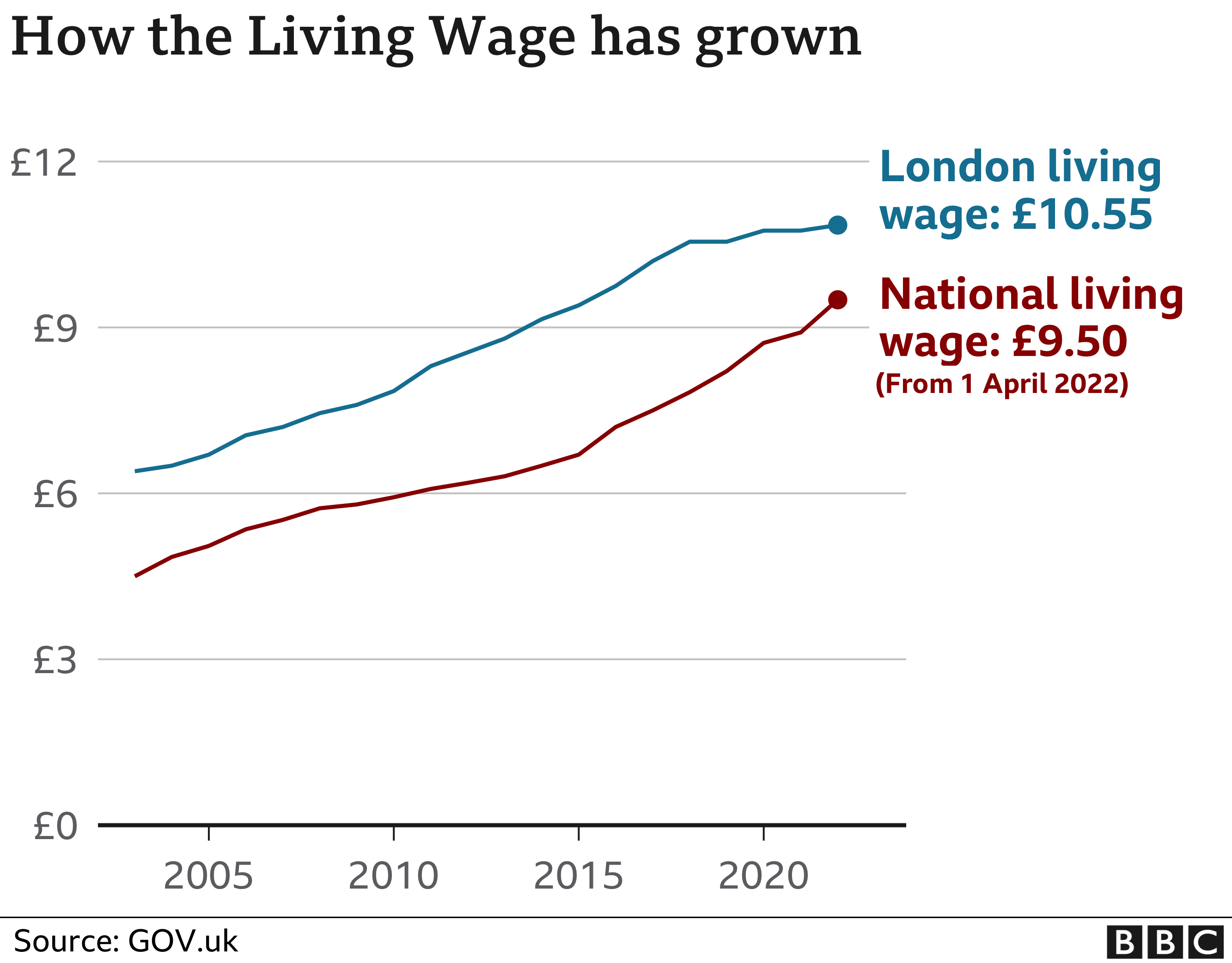
The National Living Wage is set to rise from £8.91 per hour to £9.50 in the Budget on Wednesday.
This is a 6.6% increase in the minimum wage for all those aged 23 and over – more than twice the current 3.1% rise in the cost of living.
It will take effect from 1 April next year.
The government has come under pressure to help low-paid employees and younger workers, who are among the worst hit by the Covid pandemic.
The rise was recommended by campaign group the Living Wage Foundation.
Chancellor Rishi Sunak said the increase “ensures we’re making work pay and keeps us on track to meet our target to end low pay by the end of this Parliament”.
But Labour’s shadow chief secretary to the Treasury, Bridget Phillipson, described it as an “underwhelming offer” that would be mostly swallowed up by tax rises, universal credit cuts and higher energy bills.
Minimum pay rates for younger workers are also set to go up.
The National Minimum Wage for people aged 21-22 will rise from £8.36 to £9.18 an hour and the Apprentice Rate increases from £4.30 to £4.81 an hour.

Minimum wage increases from 1 April:
- National Living Wage for over-23s: From £8.91 to £9.50 an hour
- National Minimum Wage for those aged 21-22: From £8.36 to £9.18
- National Minimum Wage for 18 to 20-year-olds: From £6.56 to £6.83
- National Minimum Wage for under-18s: From £4.62 to £4.81
- The Apprentice Rate: From £4.30 to £4.81

The minimum wage that workers should get depends on their age and whether they are apprentices.
The National Minimum Wage is the minimum pay per hour to which almost all workers are entitled.
The National Living Wage is higher than the National Minimum Wage. It applies to workers who are 23 or older.

Employers often worry that a higher minimum wage will lead to more unemployment, as they will be forced to lay off workers in order to afford the increases.
But independent experts maintain there has been little or no evidence of job losses as a result of rising minimum wage levels.


Giving millions of workers a 6.6% pay rise sounds generous and will be a welcome boost to many pay packets.
It also follows the government’s – and particularly the prime minister’s – narrative of pushing towards a higher-wage economy.
Yet this would be no bumper pay day for low-income families.
They spend a higher proportion of income than others on heating and lighting their homes. Hefty gas and electricity bill rises, on top of recent increases this month, are inevitable in the spring. Prices in the shops are going up and many economists believe the increases could last longer than previously expected.
Finally, a National Living Wage rise is not compensation for welfare cuts, such as a removal of the £20-a-week universal credit uplift, as the Institute for Fiscal Studies has consistently pointed out.
Not all of those receiving benefits are in work, and for low-income employees who are, a rise in wages can mean a reduction in their benefits.

The move comes as households face an economic squeeze from the soaring cost of energy and rising consumer prices.
The Bank of England’s chief economist, Huw Pill, has warned that UK inflation is likely to hit or surpass 5% by early next year, leading analysts to predict that interest rates could go up as early as next month.
Chancellor Rishi Sunak is also eager to begin balancing the books after the strain of financing pandemic emergency measures, with higher taxes likely to be in the offing.
Measures to trim public spending have already begun with the end of the £20-a-week temporary increase to universal credit payments, which was brought in at the start of the pandemic and withdrawn again earlier this month.

How will you be affected by the increase to the National Living Wage? Email haveyoursay@bbc.co.uk.
Please include a contact number if you are willing to speak to a BBC journalist. You can also get in touch in the following ways:
- WhatsApp: +44 7756 165803
- Tweet: @BBC_HaveYourSay
- Upload pictures or video
- Please read our terms & conditions and privacy policy
If you are reading this page and can’t see the form you will need to visit the mobile version of the BBC website to submit your question or comment or you can email us at HaveYourSay@bbc.co.uk. Please include your name, age and location with any submission.
